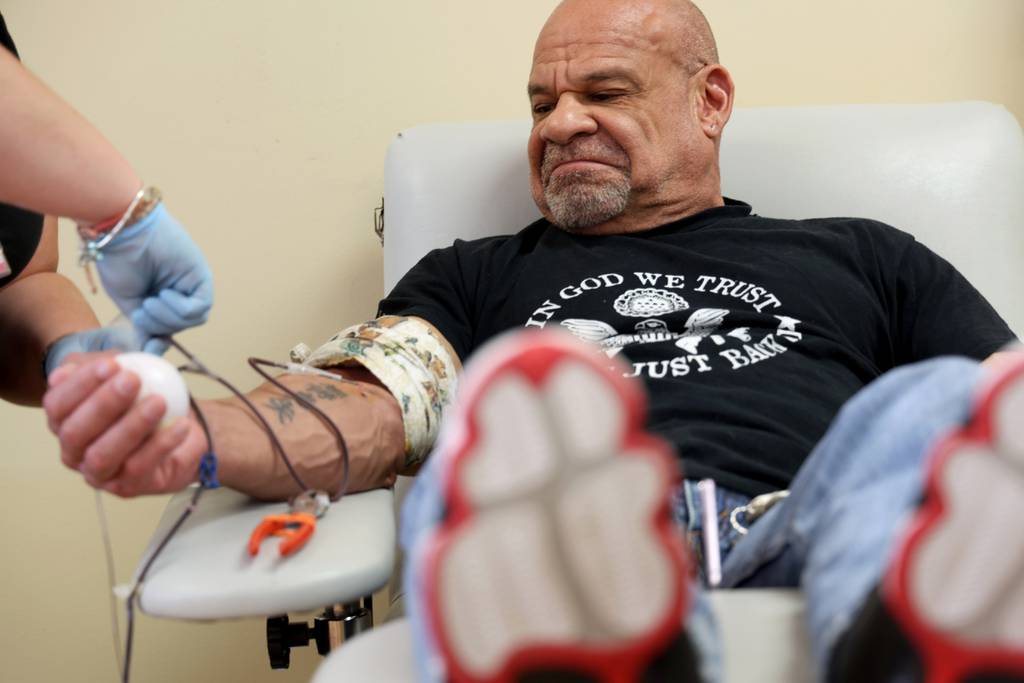Blood
Chicago blood suppliers make urgent donor appeal amid shortage
Three major blood suppliers for Chicago hospitals are warning of potential rationing amid an ongoing blood shortage in the wake of the pandemic and are making an urgent appeal for more people to donate.
With a decline in donations since the COVID-19, the supply has reached a troubling low in the last month, according to leaders from the American Red Cross of Illinois, Versiti and Vitalant. As appointment gaps grow and stock sinks, the blood suppliers fear hospitals could soon be forced to make difficult choices to ration blood.
“We don’t ever want to be in a situation where we have to start making a decision on who does and doesn’t get blood,” said Versiti’s area vice president, Amy Smith. “We need it now.”
Versiti seeks to have 10,000 units of blood in its inventory. Instead, inventory has dropped to 2,800 units for the nonprofit, which supplies blood to 85 nearby hospitals, including Northwestern Memorial Hospital, Edward-Elmhurst Health and Silver Cross Hospital.
The average patient requires 5 to 6 units of blood, but the number can vary wildly. Sometimes a patient can require up to 40 or 50 units of blood, suppliers said. If tragedy strikes, there might not be enough, Smith said.
Now at the lowest inventory levels in over a year, Versiti issued a public appeal Sunday flagging its 2,500 open appointments this week. Like Red Cross, which issued an appeal for donations on Sept. 11, it was the supplier’s first such appeal since 2021. The organization extended donation capacity and added hours, but new appointments since the call-to-action have been “nowhere near what we had expected,” Smith said.
“We’re not seeing that trend turn around. And the appointment gaps continue to grow,” she said. “They’re just not coming in and thinking about donation as something important.”
Blood donations serve patients experiencing cancer, hemophilia, sickle cell disease, pregnancy and premature birth, she said. If hospitals don’t have enough blood, critical patients would get the limited supply first, she added. Suppliers like Versiti, part of the Blood Centers of America network, would also appeal to blood banks in other cities — a difficult request as the country faces a nationwide shortage.
When blood is given, it takes up to three days to test it before it can be used, Smith said. That means the best time to donate is as soon as possible, she added. She called on anyone eligible to donate to do so now, and to make their donation regular so that future shortages don’t occur.
“We’ve got to think about this as an ongoing need and not get to the point where we’re pleading and begging for our community to come in and do their civic duty to make sure we have this for our patients,” Smith said.
Spokespeople from six hospitals and health systems across the Chicago area told the Tribune they have not directly experienced issues related to the blood shortage. However, many said they are aware of the shortage and rely on blood supplies for patient care. They encouraged people to donate.
The fact that hospitals haven’t felt the shortage shows blood suppliers are effectively prioritizing where to send blood, Red Cross of Illinois spokesperson Joy Squier said.
The national blood shortage the American Red Cross declared on Sept. 11 is ongoing in Chicago, where the nonprofit serves major providers like Rush University Medical Center, Lurie Children’s Hospital, Loyola Medicine and Advocate Health Care, Squier said.
The organization’s donations fell 25% in August, she said. People were understandably occupied with vacations, getting back to school and more, she said.
“It was a busy summer, people had a lot to do,” Squier said.
But that doesn’t change the inescapable reality that people constantly need blood, she added.
“People are not coming out to donate,” Squier said. “Blood can’t be manufactured. It’s only from an individual who gives from themselves.”
Like Vitalant and Versiti, the Red Cross needs donations of all blood types, she said. There has been a slight uptick in donations for the organization, which handles 40% of the nation’s blood supply, but more donors are needed, she said.
Anyone could need blood at any time, she added.
“I want people to roll up their sleeves,” Squier said. “Make an appointment in the days and weeks to come.”
The 42-day shelf life of blood means donations are constantly needed and the recent dip in donations directly affects current inventory. Blood can’t be stockpiled when people aren’t donating, she said.
The “bread and butter” donor base for Vitalant has been broken up since the pandemic, said Jamie Lauer, who leads mobile blood drive organizing for the nonprofit across Chicagoland. Businesses used to offer an effective spot to run blood drives, but now many employees are working from home, she said.
Donations are down 20% since 2019, and this summer saw a sharp drop, Lauer added. Vitalant hasn’t made a public appeal for more blood yet, but is in a “critical need,” she said.
The organization is looking in particular for Type O blood and also needs platelets for patients dealing with cancer, organ transplants and open-heart surgery, she said.
“The more people who do step up, we can avoid delays in patient care,” Lauer said. “There is no replacement for blood.”
To make an appointment to donate blood, visit versiti.org, redcrossblood.org or vitalant.org.

